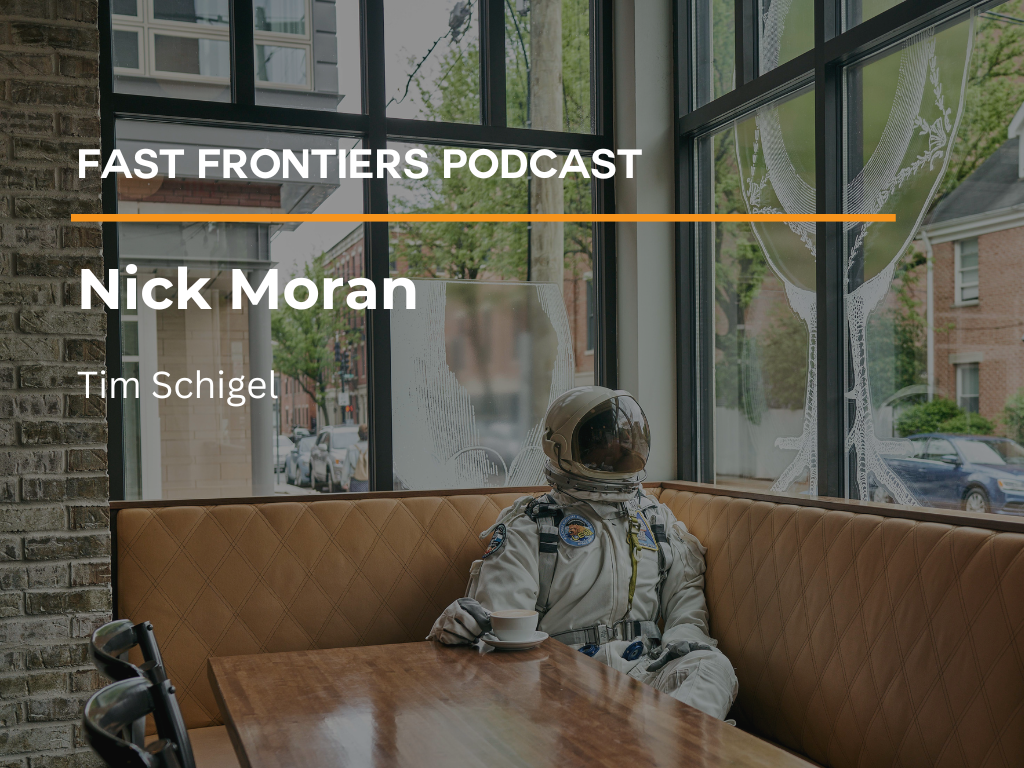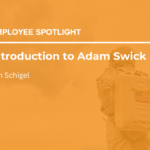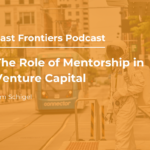Our guest for our most recent podcast was Nick Moran, founder and general partner of New Stack Ventures. Before New Stack, Nick worked for Danaher Corporation in M&A and product management. While there, he developed one of their most successful products in the company’s history, an analytical device for testing compounds in drinking water at nanoscale. In addition to investing, Nick founded the first venture capital podcast, The Full Ratchet, in Chicago, Illinois.
The whole premise for this podcast is that innovation is popping up in unexpected, surprising places—no longer constrained geographically or by other boundaries—and the people who operate in the frontiers are the pioneers. So I knew that a sit-down with Nick was made to order. Below is a snapshot of our much longer conversation, which you can listen to on our podcast.
Q: Nick, what you’re doing—and have done—with New Stack definitely fits this pioneering mold. Can you share with us a bit about what pioneering in this space of tech entrepreneur startups and venture has been like for you thus far?
“Well, I may be a founder myself, because I’ve created this venture capital firm. But it’s really about the founders we’re investing in. They’re the true pioneers. They’re the true folks that are taking inordinate risk, and doing it in environments that have not traditionally been very conducive to folks taking that level of risk.”
Nick added, “[Our approach is different in that] we don’t fancy ourselves as the boss. We fancy ourselves as service providers. We’re in the financial services industry. Our job is to serve founders, not prevent their success. From the very beginning, beyond the capital, we’re just trying to accelerate their vision and help them deal with challenges and barriers to their success.”
Nick explained how important choosing the right individual to back is: “If you find really special individuals that are building compelling businesses, they’re going to have some success. You can help them get there more easily, and more quickly, and more capital efficiently. Or you can be problematic and impede that success. We’ve done our best to try and promote the founders that are overlooked. That are in regions that don’t get the same attention as the Bay Area. So far, it’s been the most rewarding thing I’ve done in my life.”
Q: And speaking of people, one thing that I love about your philosophy is how you encourage us to think of this industry as a human industry. Can you elaborate on that, Nick?
“Well, the human element is super important. We’re all people. At the end of the day, it’s people that build businesses and build value. It’s not strategies.” Nick provided us with critical questions for determining whether a person is a good fit for your particular endeavor, including: “Are the people behind it right people? Are they mission-driven? Are they committed for the next ten plus years of their life? Were they put on this planet to build this particular startup? Does their background and their main expertise suggest that they are the best people in the world to create transformation technology in that area?”
Q: Another factor that you point out as vital to the success of any startup is leadership. Why is this?
“The tricky part about startups is, there are thousands of podcasts now that are focused on the glamor and the glory and the hype of building a startup, and becoming the next Mark Zuckerberg. I think that those are very counterproductive. I do not think that this is a glamorous thing to do. I think you have to be a player. You have to be a coach. You have to evolve into a leader.”
Nick added: “As the startup progresses over time, the doing becomes much less, and the leading becomes much more. It really takes a rare person, and a rare mindset, that can evolve through all those roles, and optimize around each as a startup progresses.”
Q: What do you do specifically to assist or coach entrepreneurs on their journey?
“We try not to be the experts in a founder’s business. We recognize the fact that they should be much deeper and much more knowledgeable about their specific opportunity and their domain than we will ever be. We try not to impose too much esoteric knowledge in their category.”
That being said, Nick did add that there are business characteristics, such as pricing strategies, business models, and such, that can be seen as patterns across businesses. According to Nick, his job is to objectively present data to founders, then have them find the right path. “I don’t have all the right answers, but there are methods that can be employed to get to the right answers.”
Nick elaborated: “The best investors are listeners. They ask open-ended questions. They don’t talk much. They just process the answers from the founders. The founder that can get me really excited about their vision and mindset has a clear short-term path to develop a product, get it into market, show traction around a specific application or customer market, then also pair that with a huge long term vision.”
Nick provided so much to chew on during our conversation, and this summary barely scratched the surface of it all. To hear more about all the new things Nick and his colleagues are pioneering right now, head to our link to listen to the full Fast Frontiers podcast episode 6.



